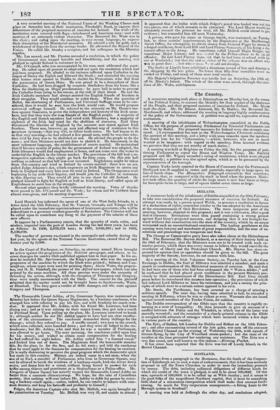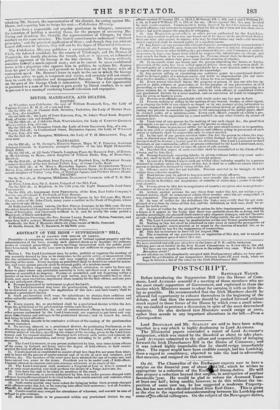SCOTLAND.
It appears from a paragraph in the Scotsman, that the funds of the Corpora- tion of Edinburgh are in such a state of embarrassment, that it has been seriously proposed to sell the Town Churches in order to meet the immediate pressure for money. The debt, including collateral obligations of different kinds for which the credit of the town is pledged, is said to be about 700,000/. Of this sum, upwards of 100,000/. is to be called up at Whit-Sunday; and it seems to time good folks of the magnificent Northern capital, that it must be something little short of a miraculous interposition which shall make that amount forth- coming. So much for Tory corporation management,—a fitting finale to the Borough system in Scotland !
A meeting was held at Jedburgh the other day, and resolutions adopted,
telniking Mr. Steuart, the representative of the district, for voting against Mr. Hume, and requiring him to resign his seat.-- Caledonian Mercury. A letter from a respectable and popular gentleman in Glasgow, announces the intention of holding a meeting there, for the purpose of censuringMr. Ewing and thanking Mr. Oswald, the representatives of Glasgow, for their conduct on the same occasion. The Scotch constituencies understand "abstract Twinciples," and the practical application of them ;. and though they can tolerate honest difference of opinion, they will not be the dupes of Ministerial trimmers. The Caledonian Mercury publishes a correspondence between Sir George Clerk, the defeated candidate for the county of Edinburgh, and Dr. Renton of
Pennicuik, the family v the tenant, and, as it appears, an influential political opponent of Sir George at the late election. Sir George evidently considers hithself a much-injured man ; and as he cannot be upon confidential terms with a physician who opposes him in politics, he cashiers Dr. Renton from his post as his doctor, and proceeds to turn him out of his house with all convenient speed. Dr. Renton's letter in reply to the one in which Sir George gives him notice to quit, is temperate and severe, and certainly will not contri- bute to sooth the vindictive and disappointed Baronet. The whole proceeding on the part of Sir George Clerk is instructive. Whenever a fair opportunity is presented to a man of his stamp to gain credit by liberal conduct, he is sure to pervert it to a means.of rendering himself ridiculous and unpopular.



















 Previous page
Previous page